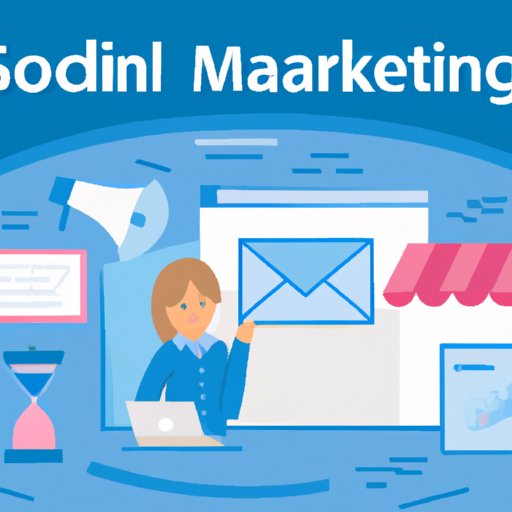Introduction
Marketing is an important part of any business, but it can be especially vital for small businesses. Small businesses often have limited resources and budgets, so they need to make the most of their marketing efforts. By improving their marketing strategies, small businesses can reach new customers, increase brand awareness, and generate more leads and sales.
Definition of Small Business Marketing
Small business marketing involves the use of various tactics and channels to promote a business and its products or services. These tactics include digital marketing, such as search engine optimization (SEO), social media marketing, email marketing, and content marketing; traditional marketing, such as print and broadcast advertising; and public relations. The goal of small business marketing is to reach potential customers and persuade them to purchase the business’s products or services.

Benefits of Improving Small Business Marketing
Improving small business marketing can have many benefits. It can help increase brand awareness, reach more potential customers, generate more leads and sales, and create a positive perception of the business. Additionally, effective marketing can help build relationships with customers, improve customer loyalty, and even drive up prices. In short, improving small business marketing can have a significant impact on the success of the business.
Leverage Social Media Platforms
Social media is a great way for small businesses to reach potential customers and engage with existing ones. It allows businesses to share updates, respond to customer inquiries, and build relationships with their audiences. Here are some tips for leveraging social media platforms for small business marketing:
Identifying the Right Platforms
The first step in leveraging social media for small business marketing is to identify the right platforms. Different platforms have different demographics, so it’s important to choose the ones that will best reach your target audience. For example, if you’re targeting millennials, then Instagram and Snapchat might be better choices than LinkedIn.
Creating Engaging Content
Once you’ve identified the right platforms, the next step is to create engaging content. Posting interesting, relevant content can help attract followers, keep them engaged, and encourage them to take action. Additionally, using visuals such as images and videos can help make your posts more eye-catching and increase engagement.
Building a Following
Finally, it’s important to build a following on social media. This can be done by posting regularly, interacting with other users, and running promotions and campaigns. Additionally, using hashtags, participating in conversations, and tagging other users can also help increase visibility and build a larger following.
Develop an SEO Strategy
Search engine optimization (SEO) is an important part of small business marketing. SEO helps businesses rank higher in search engine results pages (SERPs) and increases visibility. Here are some tips for developing an SEO strategy for small business marketing:
Understanding Keywords
The first step in developing an SEO strategy is to understand keywords. Keywords are words or phrases that people use when searching for information online. Knowing which keywords are relevant to your business can help you create content that ranks well in SERPs and reaches potential customers.
Optimizing Your Website
Next, it’s important to optimize your website for SEO. This includes making sure your website is mobile-friendly, loading quickly, and easy to navigate. Additionally, you should make sure your website has quality content, uses meta tags and page titles, and has internal links.
Generating Quality Links
Finally, it’s important to generate quality links. Link building is an important part of SEO, and it involves getting other websites to link to yours. This can be done through guest blogging, directory listings, press releases, and more. Quality links can help boost your rankings in SERPs.
Utilize Email Marketing
Email marketing is another powerful tool for small business marketing. It allows businesses to send targeted emails to their subscribers and keep them updated on new products, special offers, and more. Here are some tips for utilizing email marketing for small business marketing:
Creating a List of Subscribers
The first step in utilizing email marketing is to create a list of subscribers. This can be done by offering an incentive for signing up, such as a discount or freebie. Additionally, you can use social media and your website to encourage people to join your mailing list.
Crafting Compelling Messages
Once you have a list of subscribers, the next step is to craft compelling messages. Your emails should be well-written, informative, and engaging. Additionally, you should use visuals such as images and videos to make your emails more visually appealing.
Utilizing Automation
Finally, it’s important to utilize automation. Automation tools allow you to schedule emails in advance, personalize messages, and track performance. Automation can help save time and ensure that your emails are sent out consistently.
Create a Blog
Having a blog is an excellent way for small businesses to reach potential customers and establish themselves as thought leaders in their industry. Here are some tips for creating a successful blog for small business marketing:
Researching Topics
The first step in creating a blog is to research topics. It’s important to write about topics that are relevant to your business and will interest your target audience. Additionally, you should make sure your topics are timely and provide value to readers.
Writing Engaging Content
Once you’ve identified topics, the next step is to write engaging content. Your content should be well-written, informative, and entertaining. Additionally, you should use visuals such as images and videos to make your posts more visually appealing.
Promoting Content
Finally, it’s important to promote your content. You can do this by sharing your posts on social media, submitting them to directories, and reaching out to influencers. Additionally, you can use SEO techniques such as optimizing your content for keywords and generating quality links.
Incorporate Video Content
Video content is becoming increasingly popular and is an effective tool for small business marketing. Videos can help engage viewers and convey messages in an entertaining and memorable way. Here are some tips for incorporating video content into small business marketing:
Identifying Platforms
The first step in incorporating video content is to identify the right platforms. YouTube and Vimeo are popular video hosting sites, but there are also many other options such as Facebook, Instagram, and TikTok. It’s important to choose the platforms that will best reach your target audience.
Creating Engaging Videos
Once you’ve identified the right platforms, the next step is to create engaging videos. Your videos should be well-made, informative, and entertaining. Additionally, you should use visuals such as graphics and animations to make your videos more eye-catching.
Optimizing Videos
Finally, it’s important to optimize your videos for SEO. This includes using keywords in the title and description, adding closed captions, and creating transcripts. Additionally, you should use thumbnails and tags to make your videos easier to find.
Invest in Paid Advertising
Paid advertising is a great way for small businesses to reach potential customers and get their message out quickly. Here are some tips for investing in paid advertising for small business marketing:
Understanding Target Audience
The first step in investing in paid advertising is to understand your target audience. Knowing who you’re trying to reach can help you create more targeted ads and increase the effectiveness of your campaigns.
Identifying Ad Channels
Next, it’s important to identify the right ad channels. There are many different ad platforms, such as Google Ads, Facebook Ads, and Instagram Ads. It’s important to choose the platforms that will best reach your target audience.
Tracking Performance
Finally, it’s important to track the performance of your ads. This can be done by monitoring metrics such as clicks, impressions, and conversions. Tracking performance can help you determine what’s working and what’s not, and adjust your campaigns accordingly.
Establish Partnerships with Influencers
Partnering with influencers can be an effective way for small businesses to reach potential customers and increase brand awareness. Here are some tips for establishing partnerships with influencers:
Identifying Relevant Influencers
The first step in partnering with influencers is to identify relevant influencers. It’s important to find influencers who are active in your industry and have a large following. Additionally, you should make sure the influencers align with your values and mission.
Crafting Engaging Messages
Once you’ve identified the right influencers, the next step is to craft engaging messages. Your messages should be well-written, informative, and tailored to the influencer’s audience. Additionally, you should include visuals such as images and videos to make your messages more eye-catching.
Monitoring Performance
Finally, it’s important to monitor the performance of your campaigns. This can be done by tracking metrics such as impressions, clicks, and conversions. Monitoring performance can help you determine what’s working and what’s not, and adjust your campaigns accordingly.
Conclusion
Marketing is essential for small businesses. By improving their marketing strategies, small businesses can reach new customers, increase brand awareness, and generate more leads and sales. Improving small business marketing can be done by leveraging social media platforms, developing an SEO strategy, utilizing email marketing, creating a blog, incorporating video content, investing in paid advertising, and establishing partnerships with influencers.
Summary of Key Points
Small business marketing involves the use of various tactics and channels to promote a business and its products or services. Improving small business marketing can have many benefits, including increasing brand awareness, reaching more potential customers, and generating more leads and sales. Strategies for improving small business marketing include leveraging social media, developing an SEO strategy, utilizing email marketing, creating a blog, incorporating video content, investing in paid advertising, and establishing partnerships with influencers.
Recommendations for Moving Forward
To improve small business marketing, it’s important to identify the right platforms, create engaging content, build a following, understand keywords, optimize your website, generate quality links, create a list of subscribers, craft compelling messages, utilize automation, research topics, write engaging content, promote content, identify ad channels, track performance, identify relevant influencers, craft engaging messages, and monitor performance. By implementing these strategies, small businesses can make the most of their marketing efforts and increase their success.
(Note: Is this article not meeting your expectations? Do you have knowledge or insights to share? Unlock new opportunities and expand your reach by joining our authors team. Click Registration to join us and share your expertise with our readers.)
